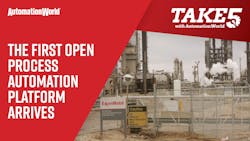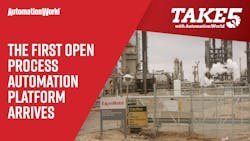Quick hits:
- The Open Process Automation Forum (OPAF) readies version 3.0 of the Open Process Automation Standard (O-PAS).
- The Coalition of Open Process Automation (COPA), managed by CPLANE.ai and Collaborative Systems Integration (CSI), is creating momentum for IT and OT technology companies to deliver products using the O-PAS standard.
- COPA QuickStart is the first commercially available open process automation (OPA) architecture bundled with a six-module training program that allows end users to better understand the technology, the process, and the skills required to manage an OPA system throughout its lifecycle.
Related to this episode:
- The First Open Industrial Control System Rolls Out
- Users Unite as the Open Process Automation Journey Continues
- How COVID-19 Pushed ExxonMobil’s Automation Technology Limits
- Download PMMI's Cybersecurity White Paper to learn the most important actions you can take now to avoid a costly cyber attack.
Welcome to Take Five with Automation World. Today I’ll be talking about a topic that has been making headlines for the past several years. That is the need for an open industrial control platform that is vendor and technology neutral and therefore avoids vendor lock-in when it comes to upgrading and scaling distributed control systems.
Since 2015, engineering executives from ExxonMobil have been challenging traditional automation practices that build on proprietary technology to create dependencies within the physical design. This set up ensures a long-term deal for the control system supplier, but makes it difficult for a manufacturer to integrate third party hardware and software where needed. Or even move to another control system.
Having seen other industry initiatives that provide a vendor-agnostic reference architecture, such as the Open Group’s Future Airborne Capability Environment for avionics systems, ExxonMobil executives looked for a way for the process industry to replicate the model.
And, despite some resistance from the vendor community, in 2017, the Open Group created the Open Process Automation Forum, a consortium of end users, suppliers, system integrators, and academics, which, at the time, was co-chaired by ExxonMobil’s Don Bartusiak.
This group was focused on developing a standards-based, secure, and interoperable process control architecture that could be used across many industries, including oil and gas, petrochemical, mining and metals, pulp and paper, food and beverage, and pharmaceutical segments.
In 2019 the group released version 1.0 of the Open Process Automation Standard, known as O-PAS, which the group described as a “standard of standards,” emphasizing that they are not reinventing the wheel, but utilizing what’s already in use for connectivity, security, and systems management. Version 1 addressed interoperability, and Version 2, released in 2020, focuses on configuration and portability. These were the first steps toward the ultimate goal of plug-and-play functionality for control equipment.
And, in anticipation of version 3.0, which promises to deliver a usable system, another new group has just been formed. It’s called the Coalition of Open Process Automation, or COPA, and the group has announced the first commercial open industrial control system.
Now, COPA is a partnership program started and managed by CPLANE.ai, a cloud infrastructure provider, and Collaborative Systems Integration, a systems integration company founded by none other than Don Bartusiak, who has since retired from ExxonMobil and is on a mission to bring his earlier vision to fruition.
COPA currently has a handful of IT and OT technology partners and is expanding its ecosystem. The purpose of the group is to create a collaboration among suppliers which support the O-PAS standard.
A point of clarification: COPA does not compete with the Open Process Automation Forum. They are complementary organizations, and as Bartusiak noted during our interview, COPA is a first attempt at finding a way to bring a production-ready open process system architecture to market. There’s a lot of learning that has to take place to build and support a secure architecture of best in class components.
That’s where COPA’s QuickStart system comes in. It is a product bundle that includes a six module training program to help end users, system integrators, and machine builders to understand the technology, the process, and the skills required to manage an open control system throughout its lifecycle.
The modules include design, such as the separation of I/O and compute power. How to configure, build tags, and start-up the system. How to operate and maintain the system. How to add advanced capabilities, such as Industrial IoT and artificial intelligence. How to maintain a secure infrastructure. And how to trouble shoot the system.
There are also simulated applications that users can practice on and learn how to configure control blocks and HMI displays, for example.
COPA QuickStart will be available in Q3 of this year, but officials emphasize that this is meant to be a learning platform so that testing and feedback will prepare manufacturers for production-ready field trials in 2022.
If you’d like to learn more about COPA QuickStart or how to join the supplier partnership program, you can click on the links below for more information.
That’s it for today’s edition of Take Five. Thank you for tuning in.





